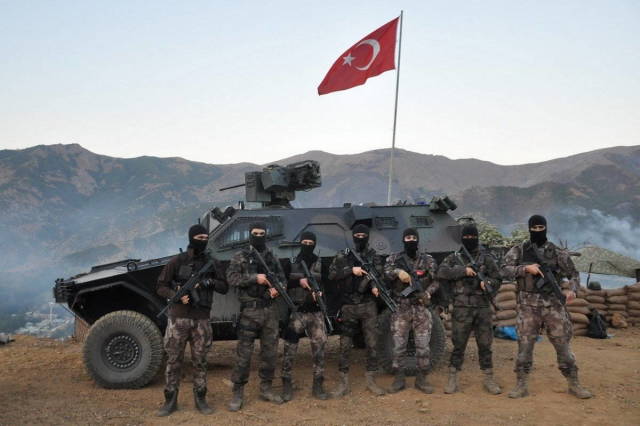Officially, the Special Operations Bureau of the Turkish Police (Polis Özel Harekat, PÖH) is designed to combat terrorism, violent and organized crime. However, after the failed military coup on July 15, 2016, the PÖH special unit received a new impetus in its development and was actually transformed into a paramilitary formation with a wide range of powers.
The unit was formed on March 22, 1983 by the decision of the Minister of Internal Affairs of Turkey and initially subordinated to the Department of Public Security. During this period, PÖH was entrusted with the tasks of combating violent crimes, freeing hostages, as well as providing bodyguards to Turkish officials and ambassadors in the country. In 1987, the Department of Public Security included PÖH in the special Operations group of the Police Department for Combating Terrorism.
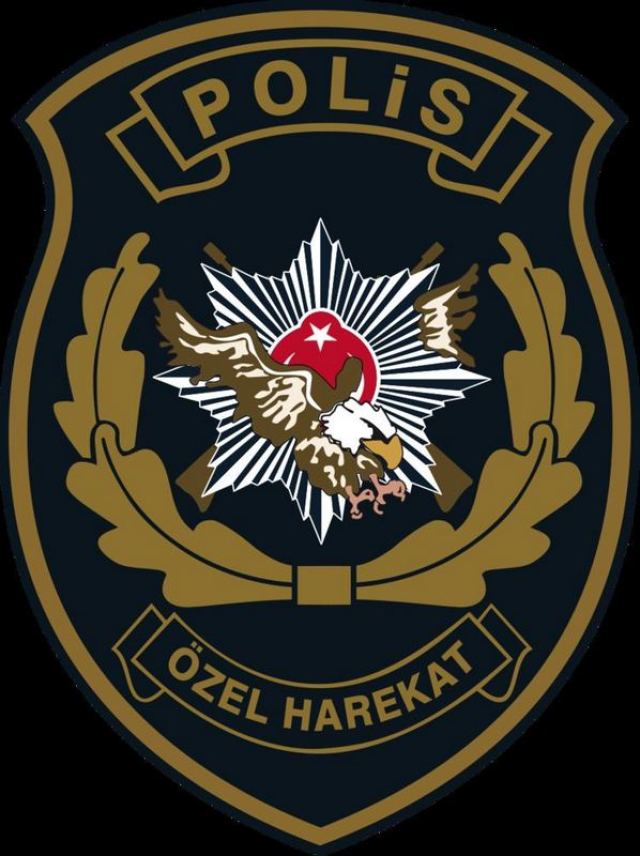
Emblem of the Special Operations Bureau of the Turkish PoliceOn July 13, 1993, PÖH was transformed into a Special Police Task Force.
As a consequence of the coup attempt, on August 25, 2017, the structure was renamed the Bureau for Special Police Operations (Bureau for Special Police Operations).
Police Special Operations Bureau: status and formation
Currently, the PÖH (hereinafter also the Bureau) reports directly to the Minister of Internal Affairs and is organizationally part of the Directorate General for Security. The Minister makes decisions on the formation and operational use of PÖH detachments. The headquarters of the Bureau is located in Ankara, the district of Gelbasi, and is headed by the President. He is supported by three vice-presidents and ten department heads. PÖH is based in 62 provinces and is divided into working (operational) groups, special units, logistics, personnel management, general and special training units.
window.yaContextCb.push(()=>{ Ya.Context.AdvManager.render({ renderTo: 'yandex_rtb_R-A-493040-4', blockId: 'R-A-493040-4' }) }) The headquarters in Gelbasi develops new concepts of operational use of forces, improves the organizational structure of the Bureau, special and combat training of employees, as well as purchases of special equipment and weapons systems.
The operations carried out by PÖH are classified according to the following special tasks:
- direct action – operational and tactical scale combat operations;
- conducting intelligence and collecting information;
- Covert operations at home and abroad (in particular, in Syria and Iraq);
- the fight against terrorism;
- release of hostages;
- special police support;
- activities aimed at improving the skills of personnel, testing new methods and tactics, combat and special equipment.
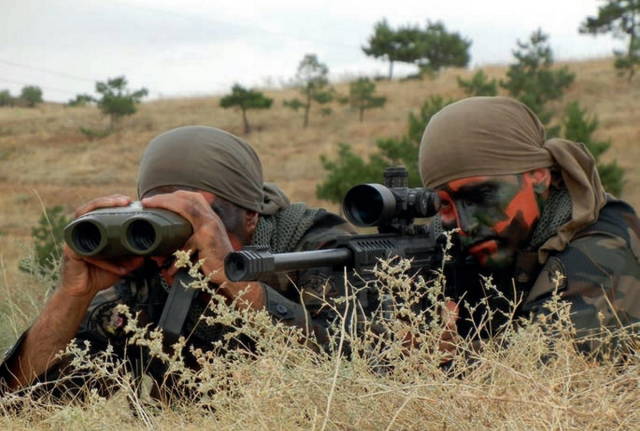
Turkey's BSOP uses specialized equipment in remote mountainous areas against terrorist organizationsAccording to Turkish sources, at the dawn of its existence, the Police Special Operations Bureau, consisting of only a few hundred policemen, "took a special position in the Turkish national consciousness."
The selection criteria were very similar to Western ones: for enlistment in the PÖH, increased requirements were imposed on the physical fitness and endurance of candidates. Another mandatory requirement was to have either a university diploma or a diploma of successful completion of the Turkish Police Academy.
During this period, until 2015, the PÖH detachments were equipped mainly with short- and long-range small arms, as well as means of protection against ballistic threats, similar to samples of similar structures in Western countries.
The period of 2015-16 had a significant impact on the development of the organization, which forced the country's leadership and the police to reconsider their views on the purpose and operational capabilities of the Bureau. The structure, conceived from the moment of its creation, as a tool for combating terrorism, is mainly used against Kurdish opposition parties and movements considered terrorist in Turkey.
window.yaContextCb.push(()=>{ Ya.Context.AdvManager.render({ renderTo: 'yandex_rtb_R-A-493040-5', blockId: 'R-A-493040-5' }) }) PÖH squads fully demonstrated their capabilities in this field in the summer of 2015 year. Then, following the results of the parliamentary elections held in the country, the pro-Kurdish Democratic Party of Peoples achieved unexpected success, and the refusal of the ruling Justice and Development Party to recognize the results of the vote caused a wave of protests among Kurds.
Trying to contain the situation, on July 24 and 25, 2015, the General Directorate of Police announced the adoption of countermeasures against provocateurs from the "Islamic State" (IS – an organization banned in the Russian Federation), declared guilty of inciting riots and carrying out terrorist attacks. In fact, the police and the army directed their actions against representatives of the Kurdistan Workers' Party (PKK) and the militant organization of the Revolutionary People's Liberation Party.
Arrests of oppositionists and retaliatory attacks by Kurds on police stations, accompanied by victims on both sides, only worsened the situation. The situation was particularly tense in the cities of Southeastern Anatolia, Diyarbakir, Hakkari, Cizre, Mardin and Nusaybin, where street battles unfolded.
According to pro-government sources, the terrorists had prepared for the attacks in advance: they had sufficient stocks of weapons, improvised explosive devices (IEDs); they dug numerous tunnels between houses; they tried to mobilize the civilian population against the Turkish security forces. A curfew was imposed in the region, and large territories were temporarily declared zones of military operations.
Allegedly, about 40 thousand soldiers and policemen participated in the clashes, which were opposed by more than 5 thousand terrorists. The losses of the army and police exceeded two hundred people, and the PKK units lost more than 3 thousand fighters. The units of the PÖH and the army confiscated thousands of large-caliber weapons and neutralized more than 10 thousand IEDs. After the fighting, the destruction was restored, and the curfew was lifted only after the cities were cleared of PKK detachments.
Coup attempt
The milestone in the development of the Special Operations Bureau of the Police was the already mentioned coup attempt in 2016. Leaving aside the true reasons for the events that took place, we note that according to pro-government sources, the attempt of part of the Turkish military to overthrow the government of President Recep Tayyip Erdogan and the cabinet of Binali Yıldırım "is perceived in the recent history of Turkey as a betrayal by the military of its own people." In Ankara and Istanbul, there were serious clashes between the putschists and the civilian population, which prevented the coup. In these circumstances, the police and the PÖH took the side of the President and the people. The putschists took brutal measures to suppress the resistance. According to some sources, more than 250 people were killed.
The situation escalated when Turkish Air Force planes bombed the parliament, the National Intelligence Center (MIT) and the PÖH headquarters in Gelbasi. On the evening of July 15, senior PÖH leaders arrived at a meeting at headquarters to discuss further measures to combat the putschists. It was at that moment that an F-16 aircraft attacked the building, killing 51 senior police officers and PÖH employees and shooting down a police helicopter.
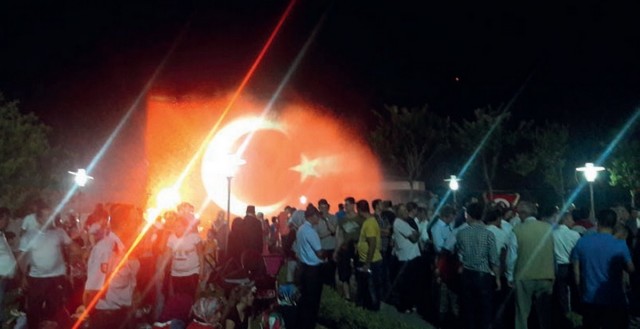
By putting themselves in the way of tanks, the civilian population of Ankara prevented an attempted coup in July 2016.As a result, after the suppression of the coup, the destroyed headquarters of PÖH was quickly restored.
It was solemnly opened by President R.T. Erdogan in the presence of family members of the deceased police officers. The failed coup attempt damaged the reputation of the army among the Turkish population. As a result, a significant number of young volunteers expressed a desire to join the Turkish police. The resulting wave of patriotism allowed the country's leadership, who was afraid of repeated speeches, to fill the vacancies quickly enough. According to some reports, during the state of emergency declared after the coup, the number of PÖH increased significantly. In total, for the period 2015-16, the Bureau of Special Operations of the Police has accepted about 10 thousand new employees into its ranks.
The rapid growth of the personnel of the formation led to a decrease in the selection criteria for the organization. The requirement for a university degree was abolished and limited to a school diploma with high performance. Although the selection procedure was adapted to the difficult situation in the police, the quality of tactical-special and fire training, on the contrary, was improved. It should be noted that, as in most similar structures in the world, professional improvement of PÖH employees is carried out during the entire period of their service in the Bureau.
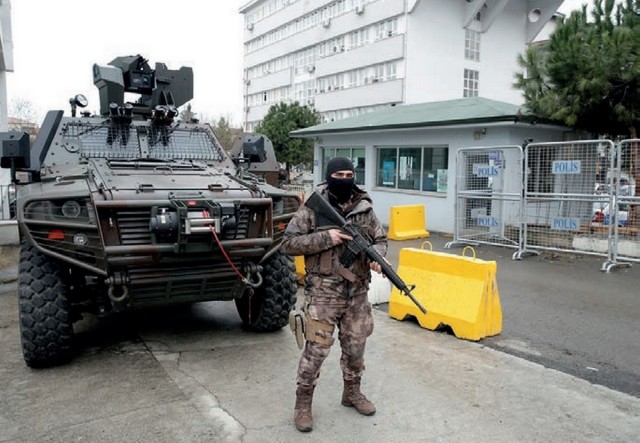
PÖH is located in 62 Turkish provinces and in many cities in northern SyriaAfter the coup attempt, PÖH received more powerful models of military systems.
In particular, shortened and long-barreled rifles with laser illumination modules, high-precision sniper rifles of foreign production, hand grenades and other weapons.
In the last three years, additional purchases of armored vehicles and other large military equipment have taken place, which has turned the PÖH into a paramilitary formation to a greater extent. Turkish-made heavy armored vehicles have entered service with the Bureau of Special Operations of the Police: KIRPI I+II, VURAN and AMAZON from the Navy, EJDER from NUROL, COBRA 2 and URAL armored vehicles manufactured by OTOKAR. The aviation fleet includes Sikorsky UH-60 BLACK HAWK helicopters. At the level of the President of the country, a proposal was considered on the feasibility of supplying the Bureau with T-129 attack helicopters, but it did not receive support.
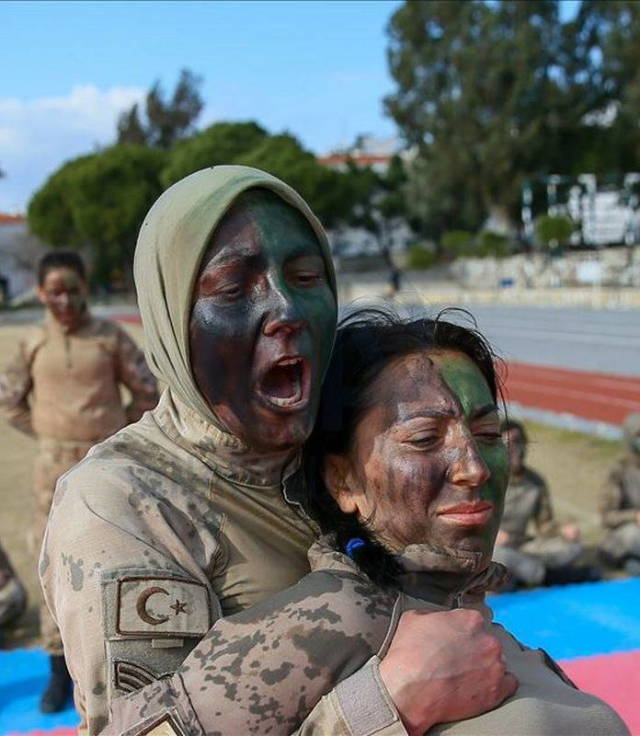
Women's squads in the BureauAs part of the PÖH, there are also groups of combat swimmers with appropriate weapons and high-speed boats.
The Bureau is one of the few special services in the world that has women's detachments for conducting so–called "front-line combat operations". According to official data published in August 2019 by Turkish Interior Minister Suleyman Soylu, the number of PÖH at that time was 25 thousand people and continued to grow.
Interaction with the Turkish Armed Forces
The participation of the Special Operations Bureau of the Police in the battles in Eastern Anatolia, as well as the coup attempt, affected not only the growth of the structure's personnel, but also the transfer of additional competencies to the PÖH aimed at closer and intensive interaction with the Turkish Armed Forces and gendarmerie paramilitary formations both in the country and abroad.
At the same time, at the initial stage, cooperation between the Bureau and the Turkish army experienced significant difficulties. Thus, during joint operations in the south of Eastern Anatolia and in Northern Syria, operational and tactical errors occurred, leading to losses. To overcome them, the command of the Turkish Armed Forces and the police leadership have made appropriate adjustments to the processes of planning operations and their medical and sanitary support.
In particular, in the Euphrates Shield operation that began on August 24, 2016, PÖH units, together with the regular Turkish army, entered the border territories of Northern Syria. The result of PÖH's activities was the creation of the so-called Free Syrian Police as local law enforcement agencies. According to the publications, the training of employees, equipment and provision of vehicles are carried out by the Turkish side. In order to support local police officers in the region, it is planned to leave about 4 thousand PÖH employees. According to experts, the offensive was the first step towards consolidation in the region, and the Bureau, meanwhile, acquired additional competencies of operational work abroad.
In particular, when planning military operations, the participation of PÖH units, as well as other special forces, began to be taken into account within the framework of the Task Force operation, that is, at the strategic and operational levels. Tactically, the Bureau's tasks have been expanded: now special police units are not only responsible for the release of hostages, the destruction of terrorist detachments or the arrests of wanted persons. Their competence also includes independent operations in the mountains, desert or forest, especially in the Black Sea region. In this regard, at the tactical level, PÖH gained access to the capabilities of various army systems, in particular heavy weapons and intelligence.
The expansion of the tasks of the PÖH and JÖH (a special unit of the Turkish gendarmerie) to independent operations in isolation from their troops and supply bases required changes in their medical and sanitary support, as well as the availability of appropriate training of employees. Currently, the personnel of these units are able to provide first aid and maintain the condition of the wounded until they are transferred to the medical evacuation teams of the regular army.
Outside the country
Solving the problems of compatibility of the army and the police structure led to the active involvement of PÖH in almost all operations of the Turkish Armed Forces conducted in the last three years on the territory of neighboring Syria. As a rule, during the active phase of their conduct, the Bureau's personnel are involved in clearing settlements and clearing IEDs. In the future, PÖH is entrusted with the tasks of securing and controlling occupied territories and creating pro-Turkish public security structures on them.
The next Turkish offensive began on January 20, 2018. Operation Olive Branch was aimed at expelling the Kurdish Self-Defense Forces and the Democratic Union Party from Afrin province in northern Syria. On March 18, the Turkish General Staff announced the successful completion of the offensive.

Turkey-backed militants of the "Free Syrian army" during the operation "Olive branch" in the beginning of 2018
Soon after the occupation of the city of Afrin, Turkey has begun to strengthen its control over the occupied area. In order to ensure security in Afrin, the Bureau has conducted the training of local security "Surt" (Surta). Organizationally, the local police is reminiscent of the structure of Turkish and comprises the following divisions: "Antiterror", "intelligence Service", "Public order", "transport Security", "crime Investigation", "Clearance" and "Commando". PÖH activities in the region koordiniruyutsya with the armed forces and intelligence agencies of Turkey.
As reported in the cities of Northern Syria, PÖH regulates not only our everyday lives and safety of the population, but also carries out covert control of the entrances and exits of cities. Officially events have a counter-terrorism focus and allegedly allowed in advance to prevent a number of attacks.
window.yaContextCb.push(()=>{ Ya.Context.AdvManager.render({ renderTo: 'yandex_rtb_R-A-493040-2', blockId: 'R-A-493040-2' }) }) October 2019 Turkey initiated another invasion of Northern Syria, under the code name "the Source of peace". While direct examples of activities PÖH surgery is not, it is safe to assume that the Bureau took an active part in it.
In conclusion, it should be noted that since the Foundation of the structure of the employees PÖH has provided assistance to other countries in creating these special units. Similar support was provided to police of Afghanistan, Albania, Algeria, Azerbaijan, Bosnia and Herzegovina, Jordan, Iraq, Kosovo, North Macedonia, Uzbekistan, Pakistan and Poland.
According to the magazine: European Security & Defence
